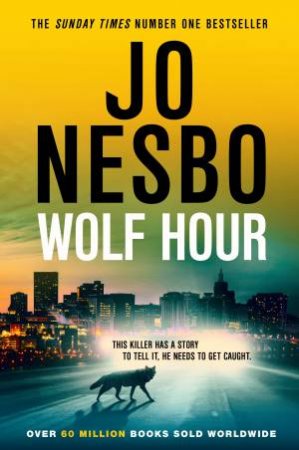Wolf hour by Jo Nesbo

Wolf hour is a satisfying crime thriller on so many levels. It begins with the account of fictional Norwegian author Holger Rudy visiting Minneapolis in order to research his book about a Norwegian American policeman’s investigation of a serial killer. His book will have all the essential elements of the genre, ‘spectacular murders’, ‘air of mystery, unexpected turn of events, villains and heroes on both sides of the law’; all of these, but above all, it will force the reader to ask ‘could that have been me?’ And that is exactly what Nesbo’s novel does.
Nesbo tells sections of the story from the point of view of a highly skilled and ruthless killer setting about his task of killing selected individuals. But we don’t know his motive or who he will target next. Other sections of the book are in third person and present the investigation undertaken by jaded detective Bob Oz, suffering from a traumatic separation from his wife. We don’t know why Bob is so self-destructive, and only discover his history and his motives, as the novel progresses, as we similarly gather clues about the killer. Bizarrely many of the clues are pieced together from conversations with a taxidermist, seemingly a confidante of both men. Nesbo, aka Holger Rudy, asks, is an author like a taxidermist, stuffing things, looking to clothe a character with the right look, the right eyes?
This is such a clever book. It takes all the elements of a crime thriller: murders, violence and guns; and turns it into a confronting debate about guns and gun control. It presents the sympathetic argument for rights to guns with black policewoman Kay Myers’ story of how growing up she felt so much safer when her mother had a gun under her pillow to protect them from an abusive estranged husband. On the other hand, guns in the hands of crazy teenagers wipe out a family, a mother and a child, and a girl in a wheelchair. Detective Bob Oz never carries a gun; only later we learn why.
Bob Oz and the killer each are suffering from a trauma, the loss of a relationship, loss of a family. It is the underlying similarities between their experiences that provides Oz with insight into the motives of the killer. But Oz, though clearly suffering from aggressive angry impulses, remains essentially a policeman with morals, on the right side of the law, whilst the killer is set on murderous revenge. What separates them, and how close does Oz come to going over the edge? Nesbo’s book becomes a book about ‘how good people can become monsters’. But guns are the tool which makes crime, and revenge, so much easier. This book makes the most powerful presentation of arguments for and against gun control, and should fuel healthy informed debate on the topic.
Themes: Thriller, Crime, Grief, Revenge, Guns, Gun control, Loneliness, Psychology.
Helen Eddy